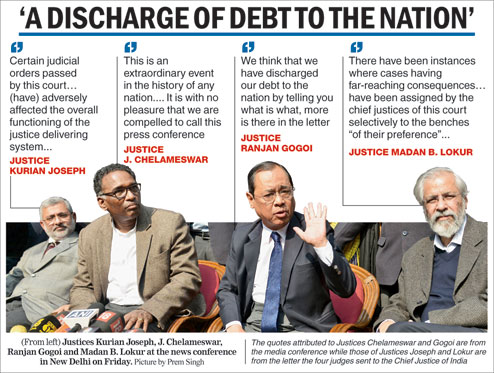
New Delhi: Four senior Supreme Court judges on Friday publicly accused Chief Justice of India Dipak Misra of bias in the allocation of cases, addressing an unprecedented news conference that tested the republic's ability to address uncomfortable questions staring at not only the last-resort judiciary but also the wider establishment.
Justices J. Chelameswar, Ranjan Gogoi, Madan B. Lokur and Kurian Joseph -the four senior-most judges after the CJI - insinuated that cases were being assigned to handpicked judges to influence the outcomes, compromising justice delivery and judicial independence.
Justice Chelameswar himself described their action as "an extraordinary event in the history of any nation".
But the executive leadership scrambled to keep the controversy at an arm's length, saying the judiciary would "sort out the matter itself". Prime Minister Narendra Modi kept a studious silence. The Opposition was more vocal.
While the four judges declined to cite specific cases despite repeated media queries, they made public a letter they said they had written to the CJI about two months ago expressing their grievances but one that hadn't been acted on.
High-profile cases like the Ayodhya title suit and Aadhaar's constitutionality - crucial to the Narendra Modi government -- are being heard by the CJI along with judges who are junior to the quartet.
The immediate trigger for the revolt seems to be the allotment of a key case on Friday, over the purported protests of the quartet, to a judge who is 10th in seniority.
Justice Arun Misra will hear a plea for an independent probe into the December 2014 death of special CBI judge B.H. Loya, who was hearing the Sohrabuddin Sheikh fake encounter case in which BJP president Amit Shah was an accused. Shah was discharged the month Loya died away from home, while attending a wedding.
The letter suggests that other CJIs too had acted in a dictatorial manner.
If Friday's development reflects the disarray in the higher judiciary at a time it has been locked in a battle of nerves with the government, it can also be interpreted as an effort to inject transparency into a system noted for its opaque functioning.
While Justice Chelameswar said the four judges were not seeking impeachment of the CJI but had come before the nation as "democracy" was at stake, Justice Gogoi said the judges were discharging their "debt to the nation".
Justice Lokur rejected any impression that the four were "breaking ranks" to target the CJI.
While a judge can resign on his own or be impeached by Parliament for proven misconduct, the framers of the Constitution seem not to have anticipated any situation like the current one. They have not provided for any disciplinary action that the CJI might take against the four fellow judges or they against him.










